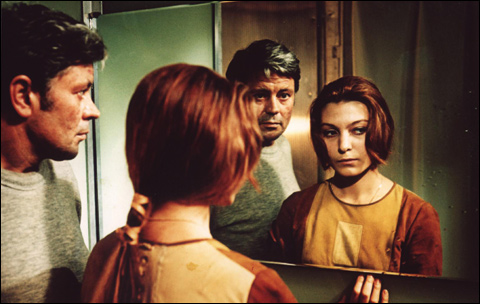
SOLARIS This long, soulful, funereal mystery from Andrei Tarkovsky may not be emblematic of the ’70s, but it’s required viewing. |
| “SF-1970” | Harvard Film Archive: June 18-28 |
Science-fiction films have been with us since Edison's 1910 version of Frankenstein, but they bloomed in the 'Nam era, nourished by a volatile cocktail of cultural ingredients. And the way the post-war youth culture morphed into a generational uprising that stormed every social rampart and left nothing in the industrialized world quite the same again was just the beginning of that cocktail. Ideas were suddenly important, and though up till then Hollywood had mostly treated science fiction as a bastard futuristic hybrid of thrillers or adventure tales, ideas were always what the genre was really about — disquieting, metaphoric ideas about the present, expressed as bedtime stories set in the dreaded days to come. (Although the genre is typecast as the geekier cousin to horror films, which are irrational, sci-fi's's thrust is more akin to satire — Twilight cannot be science fiction, but Network could be.)The 1970s was when sci-fi film came into its own. We were knee-deep in thorny symbologies and social commentary and incisive flights of imagination. Then in 1977, Star Wars arrived and made it all child's play again.
The Harvard Film Archive retrospective that begins this Friday takes a deep core sample from the period, and the layers are all American — except for the can't-go-wrong inclusion of Andrei Tarkovsky's SOLARIS (1972; June 27 at 7 pm), one of the genre's true monuments. Derived from a Stanislaw Lem novel but saturated in Tarkovsky's distinctive sensibility, it's haunted-space-station sci-fi as seen through a metaphysical filter; the onslaught on hand, endured by a psychologist sent to a research station orbiting a fickle and powerful new planet, comes entirely from memories and storages of guilt. A long, soulful, funereal mystery, Solaris is required viewing (as is the respectful 2002 Steven Soderbergh remake).
But the film is emblematic of Tarkovsky, not of the '70s. DARK STAR (1974; June 18 at 7 pm) is more like it, a low-budget post-hippie comedy from John Carpenter and Dan O'Bannon about a gaggle of astronauts stuck on a useless space mission for years, with a beachball alien they must constantly corral and an arsenal of planet-destroying bombs that are sentient, tetchy, and need to be persuaded not to self-destruct. Wittier and subtler than anything Carpenter has done since, the movie serves as a laughing-gas remake of 2001: A Space Odyssey's thorax, echoing that film's lonely-tech-future vibe but seeing clearly the proximity of farce in a way Kubrick did only with his anti-gravity-toilet instructions.
Certainly farcical, John Coney's SPACE IS THE PLACE (1974; June 21 at 7 pm) features "afrofuturistic" windbag Sun Ra as an alien missionary, or something, touching down in Oakland; it survives as what you get when experimental musicians decide to make movies. Nicolas Roeg's THE MAN WHO FELL TO EARTH (1976; June 19 at 7 pm) is far more resonant, extrapolating the alien-among-humans idea of The Day the Earth Stood Still by imagining how David Bowie's saturnine E.T., stranded on Earth, would eventually become completely human — hollow, soulless, materialistic, and selfish. Roeg's elliptical, zoom-happy, off-kilter style may be the decade's signature modus, and this is a cool film with a miserable heart.